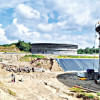Grafts reign supreme in import trade

The system for pre-shipment inspection (PSI) of imports has become riddled with corruption, and plagued by tax dodging and money laundering, depriving the country of huge amounts of revenue, reveals an investigation by The Daily Star.
Behind the large scale corruption is a nexus of some businessmen, politicians, taxmen and PSI staff who have plundered government revenues since the system was made mandatory in 2000.
The exact amount the scams have cost the country is difficult to know, but businessmen and revenue experts believe the sum is well in excess of 1,000 crore taka a year. Now the National Board of Revenue (NBR) has been forced to act, cancelling the license of one PSI company and launching probes into the activities of others. "NBR will go for instant actions, if it finds any PSI company involved in irregularities," NBR Chairman Muhammad Abdul Mazid told The Daily Star.
"Though we have cancelled license of one company, but none of the three others is innocent." The PSI system was introduced to help the National Board of Revenue (NBR) generate revenue by minimising corruption in customs and ending hassle for importers in clearing goods. However it is now being abused at will, and swamped by phoney declarations, under or over invoicing, false inspections and fraudulent certification of consignments.
"Name whatever latest weapon or luxury item you want, it can be smuggled in as any legal item. Let's not bother about the duty!" says a top player in the syndicate that controls much of the PSI business with a laugh.
Keep reading -
In the course of investigation, The Daily Star came to know about numerous abuses: Rolls Royce without doors was imported as non-usable vehicle to dodge hefty taxes. The doors arrived in different container, and the super luxury vehicle was seen on the Dhaka roads complete with snugly fitting doors. In another case, an exclusive Mercedes Benz was landed at Chittagong port and declared as scrap although it was in pristine condition. When checked another consignment, duty-free computers became heavy-duty sophisticated photocopier machines. Containers of tennis balls turned into containers of contraband B&H cigarettes at the Inland Container Depot (ICD) in Kamlapur, while hugely expensive Hummer SUV vehicles were shown at least two times cheaper on the government's tax sheet than their actual value. VCDs became cigarettes after import. And there are plenty more skeletons to be found out in the NBR-customs closet.
The investigation of the taskforces as well as the Anti-Corruption Commission could not yet reveal much as the corruption web is very complicated and money-laundering network works efficiently all over the globe in the form of hundi-- the age-old underworld money transfer system.
With a grim face, the country's first-ever Tax Ombudsman, Khairuzzaman Chowdhury confirmed the untold tale of smuggling and money laundering. "What has come out so far is just the tip of a corruption iceberg. Possibly, we may never get to the bottom of it," he said.
The massive corruption went on mostly unnoticed for years until the taskforces cracked down on the Chittagong port early last year. In March, the sheer scale of abuse forced the NBR to cancel the license of PSI company Cotecna Inspection SA. It is not the first time Cotecna has run into problems with the NBR, which has already issued several warnings to the company and dealt out several crore taka worth of fines following probes into the Swiss group's operations. Indeed the National Coordination Committee against Grievous Offences asked the Central Intelligence Cell of NBR to take legal action against Cotecna for its alleged illegal activities back in December last year.
However, the stern action of today mocked NBR's decision to award about 50 percent import areas to a relatively inexperienced company like Cotecna that has no offices in many of the main cities in countries of the blocks assigned to it-- a major qualification for the PSI job. NBR turned to the PSI system against a backdrop of massive corruption and harassment by a significant section of customs people, but its major move failed to live up to expectation as irregularities started with awarding of first license to 3 companies, dividing countries of import in 3 blocks.
The mandatory PSI system started off on the wrong foot with then prime minister Sheikh Hasina bending the first PSI order using her 'inherent power' to award license to the Intertek Testing Service (ITS) International Limited in 2000 after the lowest bidder Inspectorate Griffith pulled out of Block A-- which includes China, Hong Kong and 45 European countries.
Without considering options for close tender or re-tender after the pullout, NBR offered the job to ITS, the highest bidder in the block, initially for 3 years at a service charge rate 0.14 percent higher than the lowest bid of 0.45 percent after the Prime Minister's Office (PMO) office weighed in brushing aside opinions of finance and law ministries.
The government charges 1 percent of value from importers, a portion of which, fixed during tender, it shares with PSI companies for their service. The combined earnings by PSI companies should be around Tk 250 crore a year, 80 percent of which they are allowed to remit. Then NBR chairman Abdul Muyeed Chowdhury in his note stated that the prime minister ordered 'to award three blocks to three companies for the sake of public interest and to protect revenue interest.' But the ACC is now examining the low pricing in the ITS contract through which the country allegedly missed out on over Tk 100 crore in revenue in five and half years of the deal. Buoyed by taskforce finds and ACC initiative, NBR, after all these years on April 10, issued internal note to collect information on how much ITS earned in service charges during the period from 2000-2005.
All most all the PSI companies, number of which was increased to 4 after import regions were divided in 5 blocks for the second tender in 2005, had their share of controversial contract and poor performance.
Griffith ended up with series of poor performances so much so that on expiry of its 3-year contract the block was offered to ITS, which contracted out India portion to Societe General de Surveillance (SGS). Interestingly, the change in blocks took place without tender procedure. Though contract awarding evaluation committee was to check technical and financial qualifications of bidders, a small group of unscrupulous businessmen with political clouts found no problem in influencing the government machinery and policy-making circle through brokers. And when appointed the company started to return the favour to its backers.
Insiders of the PSI sector told of numerous stories, detailing how Hawa Bhaban stalwarts cashed in on the favour returned by a certain PSI company during BNP-led coalition rule.
"Did we check history of PSI companies before appointment? We considered lobbying before awarding license," remarked prominent economist Professor Muzaffer Ahmad. "Companies that got license in our country have obtained through some linkages. Some got it through money and some through political linkage."
Declined to be named, a leading PSI executive meanwhile refused to accept the allegation that all PSI companies are graft-ridden. "The allegation of irregularities and corruption in imports were there against customs even before the PSI system was made mandatory," he argued. " And it's for sure the PSI companies helped increase government revenue significantly in last eight years. There could be some mistakes in the process. But there is provision for punitive action for that."
Genuine businessmen reap the benefits of the PSI system but unscrupulous political businessmen and their partners in crime -- a section of PSI, NBR and customs officials--- manipulate the system to dodge taxes and siphon off money abroad with the help of hundi players. Dishonest importers always have documents of their choices, certified duly by related PSI companies, which are obligated to carry out 100 percent inspection of goods in addition to its valuation and classification job.
"I believe the PSI companies are not involved with this corruption, but some of their greedy employees are for sure getting a fair share of the graft," said a top tax official, wishing not to be named. According to taskforce investigations, many of our politicians, businessmen and even sidekicks of lawmakers amassed staggering wealth or bought lavish properties abroad, thanks to the PSI system manipulation and hundi. Our financial system could only see legal cash transaction as documented on invoices but the hundi networks work behind the scene to complete bulk of the money transfers involved with the imports. The caretaker government is now in touch with a few countries to bring back the money laundered by some detained graft suspects. Portion of export proceeds and remittance never enter the country after being routed into to different destinations by hundi network, confide players in the unholy league.
Million of dollars can be transferred to anywhere in the world or brought in local currencies, and it will take only few minutes for hundi network to get the job done. Meanwhile, traders can also manipulate a provision that allows importers to directly bring in goods for customs inspection, not the PSI, and get away with fines, exploiting the corrupt system.
The corruption syndicate and many of its kingpins slipped into background when the taskforces unearthed some cases of corruption through the PSI system. A PSI broker earned so much success in winning appointment that he was nicknamed Mr PSI in the circle. Mr PSI, who thrived on his links with both AL-BNP governments and NBR, went into hiding for months after taskforces and NBR moved to probe the questionable ITS contract during the AL rule.
The caretaker government has so far made some progresses in a few isolated corruption cases, feel PSI specialists, adding that it is far from tracking down the syndicated graft network, which is gobbling up country's economy and capable of creating price disorder in the import-based market.
Sources in the joint forces alleged that the syndicated graft network manipulated the market prices to cause commotion among people after the government came down hard on the racket. The PSI companies play a dominating role in poor economies and are capable of causing embarrassment to governments. They have histories of becoming partners in corruption with government top brasses in African and third world countries. Figures like former Pakistan prime minister Benazir Bhutto and her spouse Asif Ali Zardari hogged the world headlines in 2003, when a Swiss court indicted them for receiving kickbacks from SGS and Cotecna. And if investigated extensively and without any influence, a lot of high-profile names from Bangladesh will also hit world headlines, say anti-graft investigators.

 For all latest news, follow The Daily Star's Google News channel.
For all latest news, follow The Daily Star's Google News channel. 








Comments